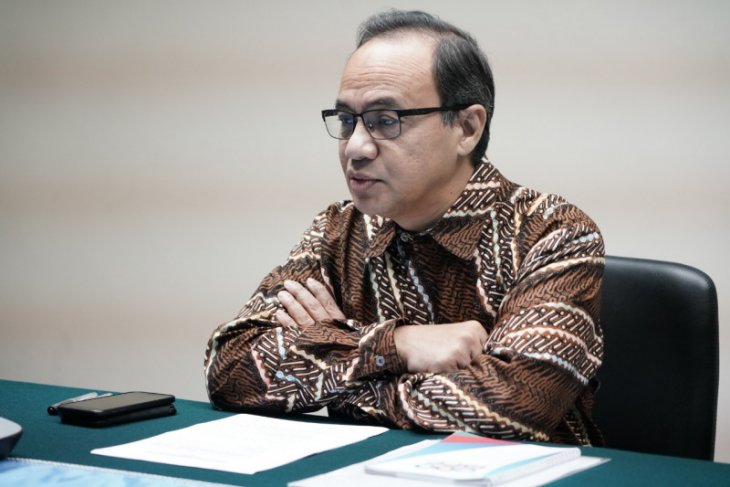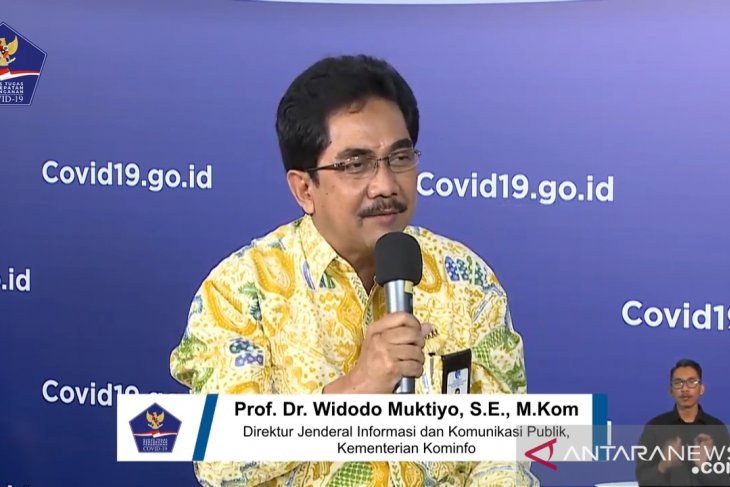Live Streaming
Program Highlight
Company Profile

Ani Hasanah
President Joko Widodo (Jokowi) has appealed to Indonesians to stay calm and patient in facing the COVID-19 ordeal.
"Let us face this ordeal calmly and patiently. Panic is half the illness, calm is half the medicine, and patience is the starting point for healing," President Jokowi remarked at the Merdeka Palace here on Thursday in his opening remarks during a videoconferencing event titled "National Prayer and Humanity".
He also called on the people to always pray to Allah, the Almighty, for help; for the protection of the people, nation, and state; as well as for the COVID-19 pandemic to end.
President Jokowi conceded to the fact that the people in Indonesia and around the world are facing a barrage of ordeals, reeling from difficult times, and struggling to break free from the shackles of the COVID-19 pandemic.
"This coronavirus outbreak has spread rapidly to more than 213 countries, and nearly 4.4 million people worldwide are infected with this coronavirus. Scores are lying in hospitals, many others are undergoing independent isolation, several are returning to Rahmatullah (the Most Merciful), and hopefully, their deaths are Husnul Khotimah (a good end) Aamiin. However, Alhamdulillah (thank Allah), many have recovered," the president remarked.
In the wake of such tumultuous times, President Jokowi has called on the Indonesian people to not despair or become pessimistic.
Vice President KH Ma'ruf Amin, Minister of Religion Fachrul Razi, and Chair of the Task Force for the Acceleration of COVID-19 Response, as well as Head of the National Disaster Mitigation Agency (BNPB) Doni Monardo, among others, partook in a joint prayer held to coincide with "World Prayer Day".
Other participants comprised six religious leaders: Confucian leader Budi Tanuwibowo, Buddhist leader Sri Pannyavaro Mahathera, Hindu leader Ida Pedanda Nabe Gede Bang Buruan Manuaba, Catholic leader Ignatius Cardinal Suharyo, Christian leader Ronny Mandang, and Islamic leader Quraish Shihab.
Until Wednesday (May 12), the number of confirmed COVID-19 cases in Indonesia had reached 15,438. A total of 3,287 people recovered, while the death toll had touched 1,028.
The number of patients under surveillance (PDP) reached 33,042, while patients under monitoring (ODP) totaled 256,299 people, and a total of 169,195 specimens were tested.
COVID-19 cases were found in 34 provinces in Indonesia, with Jakarta having the highest, at 5,554 cases; followed by 1,772 in East Java; 1,556 in West Java, 1,023 in Central Java, 803 in South Sulawesi, 580 in Banten, 344 in West Nusa Tenggara, 332 in Bali, 328 in Papua, 322 in South Sumatra, 291 in South Kalimantan, and 230 in East Kalimantan. (ANTARA)
May

Head of the Wisma Atlet Hospital Vice Admiral Yudo Margono, concurrently commander of the Joint Regional Defense Command I. (ANTARA FOTO)
A total of 172 Indonesians are receiving inpatient treatment at the Wisma Atlet Emergency Hospital (RSD) in Kemayoran, Central Jakarta, on Thursday, shortly after returning from abroad.
The Indonesians comprised ship crew members as well as jemaah tabligh members and students, head of the Wisma Atlet Hospital Vice Admiral Yudo Margono, concurrently commander of the Joint Regional Defense Command I, noted in a statement in Jakarta on Thursday.
They were among the 1,806 Indonesians, who had just arrived from abroad. Of the total, 1,006 people were allowed to return home, while 628 others were still awaiting the result of swab test, he revealed.
The 628 Indonesians were self-isolating at several locations, including the Pondok Gede hajj dormitory, Bambu Apus social shelter, and hotels whilst awaiting the result of swab test, he confirmed.
In the wake of the COVID-19 pandemic, President Joko Widodo (Jokowi) has instructed relevant ministries to take precautionary measures for the return of 34 thousand Indonesian migrant workers, whose work contract will end in May and June.
"Precautionary measures must be taken against this, and adequate preparations must be made. We should handle their arrivals through certain entry gates and monitor their movements to their hometowns," Jokowi stated during a videoconference on the acceleration of COVID-19 handling at the Merdeka Palace here on Monday.
The Kemayoran Athlete's Village was converted to officially serve as a COVID-19 Emergency Hospital on March 23, 2020. The hospital has the capacity to accommodate 12 thousand patients.
May

Indonesian Foreign Ministry's spokesperson, Teuku Faizasyah. (Handout Kemlu RI)
Malaysian authorities arrested 421 undocumented Indonesian workers during raids in several areas across the country this month and are expected to repatriate them to Indonesia once the legal process is completed, the Foreign Ministry said.
Malaysian authorities apprehended the workers for allegedly violating the country's immigration regulations, such as residing in the country without valid documents, over-staying, and possessing fake documents, Indonesian Foreign Ministry spokesperson Teuku Faizasyah told journalists in Jakarta on Wednesday.
The workers are currently being detained at the Malaysian Immigration's detention house, and the Indonesian Embassy in Kuala Lumpur has provided them with consular facilities, Faizasyah informed.
"Based on our experience, the Indonesians arrested and then detained by Malaysian Immigration (authorities) will be repatriated to Indonesia after they have completed the country's legal process," he added.
The 421 undocumented Indonesian citizens were arrested during raids in Pasar Borong Selayang, Kuala Lumpur, on May 11, 2020.
Besides the Indonesians, the Malaysian Immigration authorities have also detained 790 Myanmar citizens, 54 Indians, six Pakistanis, 78 Bangladeshis, and several other foreigners.
The Malaysian Health Ministry has declared that 7,551 foreign nationals that the country's authorities have questioned and 1,368 undocumented foreigners currently detained in the country have tested negative for the new coronavirus disease.
In view of the impact of Malaysia's movement control order (MCO) on Indonesian migrant workers, the Indonesian Government has announced aid for severely affected workers.
The government is obliged to assist all Indonesians who have been severely affected by the neighboring country's MCO policy, irrespective of their status, the Indonesian Foreign Ministry's director for the Protection of Citizens and Legal Entities Overseas, Judha Nugraha, said.
The Malaysian Government is planning to extend the enforcement of its movement order control until June 9, 2020 to slow the spread of the deadly coronavirus disease. The MCO was first imposed on March 18 this year.
Since the month of April, 348,843 recipients have been provided relief under the Indonesian government's aid program for migrant workers in Malaysia.
Coronavirus infections initially emerged in the Chinese city of Wuhan at the end of 2019. Since then, COVID-19 has spread to at least 202 countries and territories, including Malaysia and Indonesia, with a massive spurt in the death toll.
The Indonesian Government officially confirmed the country's first cases on March 2 this year. (ANTARA)
May
Ministry of Communication and Informatics Records 686 Hoaxes on COVID-19

Director General of Public Information and Communication at the Ministry of Communication and Informatics, Widodo Muktiyo. (ANTARA/Ahmad Zulfikar)
The Indonesian Ministry of Communication and Informatics has, as of Wednesday, recorded 686 false news stories, or hoaxes, in regard to COVID-19, which have disrupted the dissemination of information on the pandemic, said an official.
"There are individuals who deliberately create different information and create noise. This is a challenge for public information as well," said director general of Public Information and Communication at the Ministry of Communication and Informatics, Widodo Muktiyo, at an online discussion forum on the Task Force for the Acceleration of COVID-19 Handling completing two months, held on Wednesday in Jakarta.
He said individuals can easily produce and distribute their own information at any moment, without requiring any permits, while the Ministry of Communication and Informatics can only enforce rules and sanctions based on the regulations stipulated in the Information and Electronic Transactions Law (ITE).
"If the rules are violated, then there are sanctions. There have been 103 (individuals) who have faced criminal and legal issues to date," he informed.
With regard to hoaxes, he explained, there are three platforms on which such “noises” in information occur, the first one being the Internet.
When problems occur at this first level, a relevant ministry can communicate them to the internet service provider, he said.
The Ministry of Communication and Informatics can take direct action when false information circulates on the second platform — social media, including Instagram, Facebook, and Twitter.
When violations occur on these platforms, the Ministry or the relevant authorities can take the posts down or block them to prevent other users from seeing or accessing false information.
"The most dangerous level is the third level: closed media systems, such as WhatsApp groups," Muktiyo informed.
Despite the closed media system being more challenging to tackle than the others, he said he believed that all three platforms present their own challenges in ensuring that the public does not blindly consume false information and take it as the truth, especially considering the impact of COVID-19, which has created economic and social issues, as well as social assistance related matters.
He said fake news could add to wrong perceptions established among the public, and thus, hurt the nation and the people. (ANTARA)


